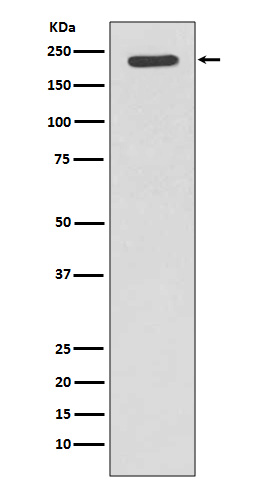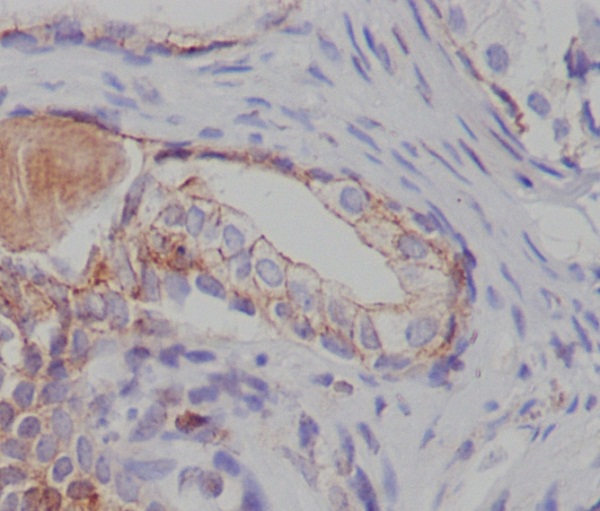Anti-Tuberin TSC2 Rabbit Monoclonal Antibody
- SPECIFICATION
- CITATIONS
- PROTOCOLS
- BACKGROUND

Application
| WB, IHC, FC |
|---|---|
| Primary Accession | P49815 |
| Host | Rabbit |
| Isotype | Rabbit IgG |
| Reactivity | Rat, Human, Mouse |
| Clonality | Monoclonal |
| Format | Liquid |
| Description | Anti-Tuberin TSC2 Rabbit Monoclonal Antibody . Tested in WB, IHC, Flow Cytometry applications. This antibody reacts with Human, Mouse, Rat. |
| Gene ID | 7249 |
|---|---|
| Other Names | Tuberin, Tuberous sclerosis 2 protein, TSC2 {ECO:0000303|PubMed:7558029, ECO:0000312|HGNC:HGNC:12363} |
| Calculated MW | 200608 MW KDa |
| Application Details | WB 1:500-1:2000 IHC 1:50-1:200 FC 1:50 |
| Subcellular Localization | Cytoplasm. Membrane; Peripheral membrane protein. At steady state found in association with membranes. |
| Tissue Specificity | Liver, brain, heart, lymphocytes, fibroblasts, biliary epithelium, pancreas, skeletal muscle, kidney, lung and placenta. |
| Contents | Rabbit IgG in phosphate buffered saline, pH 7.4, 150mM NaCl, 0.02% sodium azide and 50% glycerol, 0.4-0.5mg/ml BSA. |
| Clone Names | Clone: EGD-20 |
| Immunogen | A synthesized peptide derived from human Tuberin |
| Purification | Affinity-chromatography |
| Storage | Store at -20°C for one year. For short term storage and frequent use, store at 4°C for up to one month. Avoid repeated freeze-thaw cycles. |
| Name | TSC2 {ECO:0000303|PubMed:7558029, ECO:0000312|HGNC:HGNC:12363} |
|---|---|
| Function | Catalytic component of the TSC-TBC complex, a multiprotein complex that acts as a negative regulator of the canonical mTORC1 complex, an evolutionarily conserved central nutrient sensor that stimulates anabolic reactions and macromolecule biosynthesis to promote cellular biomass generation and growth (PubMed:12172553, PubMed:12271141, PubMed:12842888, PubMed:12906785, PubMed:15340059, PubMed:22819219, PubMed:24529379, PubMed:28215400, PubMed:33436626, PubMed:35772404). Within the TSC-TBC complex, TSC2 acts as a GTPase- activating protein (GAP) for the small GTPase RHEB, a direct activator of the protein kinase activity of mTORC1 (PubMed:12172553, PubMed:12820960, PubMed:12842888, PubMed:12906785, PubMed:15340059, PubMed:22819219, PubMed:24529379, PubMed:33436626). In absence of nutrients, the TSC-TBC complex inhibits mTORC1, thereby preventing phosphorylation of ribosomal protein S6 kinase (RPS6KB1 and RPS6KB2) and EIF4EBP1 (4E-BP1) by the mTORC1 signaling (PubMed:12172553, PubMed:12271141, PubMed:12842888, PubMed:12906785, PubMed:22819219, PubMed:24529379, PubMed:28215400, PubMed:35772404). The TSC-TBC complex is inactivated in response to nutrients, relieving inhibition of mTORC1 (PubMed:12172553, PubMed:24529379). Involved in microtubule-mediated protein transport via its ability to regulate mTORC1 signaling (By similarity). Also stimulates the intrinsic GTPase activity of the Ras- related proteins RAP1A and RAB5 (By similarity). |
| Cellular Location | Lysosome membrane; Peripheral membrane protein. Cytoplasm, cytosol Note=Recruited to lysosomal membranes in a RHEB-dependent process in absence of nutrients (PubMed:24529379). In response to insulin signaling and phosphorylation by PKB/AKT1, the complex dissociates from lysosomal membranes and relocalizes to the cytosol (PubMed:24529379) |
| Tissue Location | Liver, brain, heart, lymphocytes, fibroblasts, biliary epithelium, pancreas, skeletal muscle, kidney, lung and placenta. |

Thousands of laboratories across the world have published research that depended on the performance of antibodies from Abcepta to advance their research. Check out links to articles that cite our products in major peer-reviewed journals, organized by research category.
info@abcepta.com, and receive a free "I Love Antibodies" mug.
Provided below are standard protocols that you may find useful for product applications.
If you have used an Abcepta product and would like to share how it has performed, please click on the "Submit Review" button and provide the requested information. Our staff will examine and post your review and contact you if needed.
If you have any additional inquiries please email technical services at tech@abcepta.com.













 Foundational characteristics of cancer include proliferation, angiogenesis, migration, evasion of apoptosis, and cellular immortality. Find key markers for these cellular processes and antibodies to detect them.
Foundational characteristics of cancer include proliferation, angiogenesis, migration, evasion of apoptosis, and cellular immortality. Find key markers for these cellular processes and antibodies to detect them. The SUMOplot™ Analysis Program predicts and scores sumoylation sites in your protein. SUMOylation is a post-translational modification involved in various cellular processes, such as nuclear-cytosolic transport, transcriptional regulation, apoptosis, protein stability, response to stress, and progression through the cell cycle.
The SUMOplot™ Analysis Program predicts and scores sumoylation sites in your protein. SUMOylation is a post-translational modification involved in various cellular processes, such as nuclear-cytosolic transport, transcriptional regulation, apoptosis, protein stability, response to stress, and progression through the cell cycle. The Autophagy Receptor Motif Plotter predicts and scores autophagy receptor binding sites in your protein. Identifying proteins connected to this pathway is critical to understanding the role of autophagy in physiological as well as pathological processes such as development, differentiation, neurodegenerative diseases, stress, infection, and cancer.
The Autophagy Receptor Motif Plotter predicts and scores autophagy receptor binding sites in your protein. Identifying proteins connected to this pathway is critical to understanding the role of autophagy in physiological as well as pathological processes such as development, differentiation, neurodegenerative diseases, stress, infection, and cancer.



